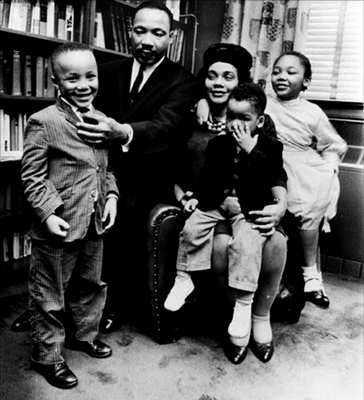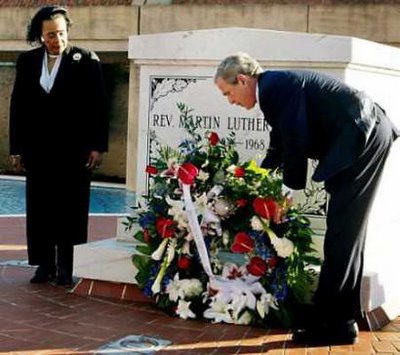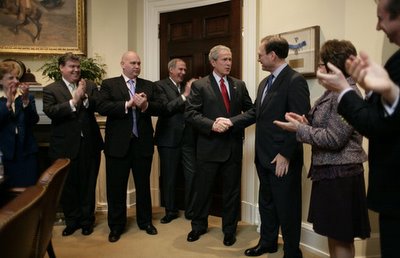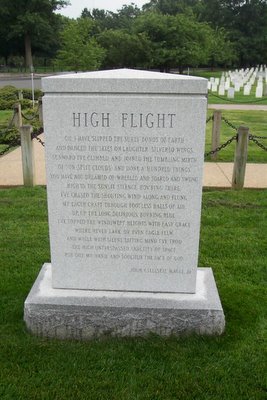Godspeed Coretta Scott King

As a young girl growing up on her parents' farm and attending classes in a one-room school in Alabama in the 1930s, Coretta Scott had no idea she would become an influential voice in America's civil rights leadership and one of the nation's most admired public figures. However, Coretta Scott King, widow of slain civil rights leader Martin Luther King Jr., became a leader of national consequence in her own right after her husband's assassination in 1968, as she courageously continued his struggle for nonviolent change, equal justice and economic opportunity for all. Mrs. King's death at 78, after a long illness, dims the lights in a movement that drew inspiration from the life's work of both her and her late husband.
It would be a mistake to think of Coretta Scott King as mainly a minister's wife living in his shadow. To be sure, she was there with him from his first day as a pastor in 1953, and she was seen by his side in civil rights demonstrations and marches as well as in Oslo at the 1964 Nobel Peace Prize ceremony. She was with him when the Montgomery bus boycott began and in their Alabama home with her daughter when a bomb was thrown on their porch in 1956. Mrs. King was also on the receiving end of despicable attempts by the FBI to smear her husband, their marriage and the civil rights movement. Through it all, Coretta Scott King, raising a family of four children, remained a figure of strength, grace and dignity.
But it was Mrs. King's determination that marked her as someone special. She evolved from a child who joined her siblings in picking cotton to help their Depression-era parents earn a living, and who walked five miles a day to grade school, to a graduate of Antioch College and Boston's New England Conservatory of Music. The murder of her husband, rather than sending her into a shell, only emboldened her to continue his work. Only days after his death, she led a march of thousands in Memphis. She was on the front lines in nationwide protests against apartheid in South Africa. To keep his legacy alive, Mrs. King raised funds for the creation of the Martin Luther King Jr. Center for Non-Violent Social Change in Atlanta, and she worked tirelessly to establish the Martin Luther King federal holiday the country now celebrates.
"Those of you who believe in what Martin Luther King Jr. stood for," Mrs. King told an audience in Memphis years ago, "I would challenge you today to see that his spirit never dies." Coretta Scott King, with a singular dedication, lived up to that challenge.

Selected Coretta Scott King Quotations
• Struggle is a never ending process. Freedom is never really won you earn it and win it in every generation.
• Women, if the soul of the nation is to be saved, I believe that you must become its soul.
• If American women would increase their voting turnout by ten percent, I think we would see an end to all of the budget cuts in programs benefiting women and children.
• The greatness of a community is most accurately measured by the compassionate actions of its members, ... a heart of grace and a soul generated by love.
• Hate is too great a burden to bear. It injures the hater more than it injures the hated.
• There is a spirit and a need and a man at the beginning of every great human advance. Every one of these must be right for that particular moment of history, or nothing happens.
• My husband was a man who hoped to be a Baptist preacher to a large, Southern, urban congregation. Instead, by the time he died in 1968, he had led millions of people into shattering forever the Southern system of segregation of the races.
• In spite of Martin's being away so much, he was wonderful with his children, and they adored him. When Daddy was home it was something special.
• Martin was an unusual person.... He was so alive and so much fun to be with. He had strength that he imparted to me and others that he met.
• About the Martin Luther King, jr., holiday: Today is not merely a holiday, but a true holy day which honors the life and legacy of Martin Luther King, Junior, in the best possible way.
• The more visible signs of protest are gone, but I think there is a realization that the tactics of the late-60s are not sufficient to meet the challenges of the 70s.
• Segregation was wrong when it was forced by white people, and I believe it is still wrong when it is requested by black people.
• Mama and Daddy King represent the best in manhood and womanhood, the best in a marriage, the kind of people we are trying to become.
• I'm fulfilled in what I do... I never thought that a lot of money or fine clothes -- the finer things of life -- would make you happy. My concept of happiness is to be filled in a spiritual sense.
• About the Confederate flag: You are right that it is a hurtful, divisive symbol and I commend you for having the courage to tell it like it is at a time when too many other political leaders are equivocating on this issue.


















